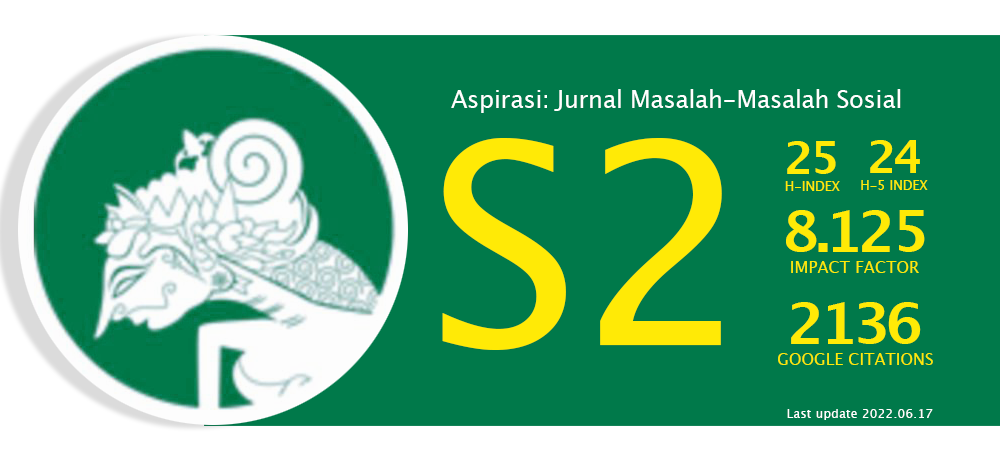Reforma Agraria di Perkotaan, Usaha Mencari Bentuk: Kasus Jakarta, Indonesia
Abstract
This research explores the effort of residents in Jakarta to defend their land and housing rights. The research question is: How are the residents’ efforts to carry out land reform by leverage in Jakarta? This study uses a case study method with data collected from government documents, journal articles, online media, and other types of secondary data. Data collecting is also done through in-depth interviews and focus group discussions with civil society activists, residents of Kampung Kota, and the administrator of Jakarta’s Agrarian Reform Task Force. Data analysis is carried out through the planning process, reviewing the literature, collecting data, to presenting and drawing a conclusion. The results of the study indicate that three foundations encourage the emergence of agrarian reform under which the residents have carried out namely the long experience of policy advocacy, the use of community action plans, and the emergence of the Agrarian Reform Task Force. Recognition through social mapping to the preparation of participatory village flat designs is an essential instrument for villagers to fight for their rights. Residents together with their social networks succeeded in encouraging 21 villages as objects of agrarian reform in Jakarta. The solidarity of the movement, support from civil society networks, and successful negotiations with Anies Baswedan became the entry point for agrarian reform from below in Jakarta. Civil society networks still have problems that must be resolved together with other stakeholders to formulate the correct form of urban agrarian reform and solve the problem of agrarian sectoral nationally.
Abstrak
Kajian ini mendalami upaya warga kampung di Jakarta dalam memperjuangkan hak atas tanah dan hunian. Pertanyaan penelitiannya adalah bagaimana upaya warga kampung kota melakukan reforma agraria dari bawah di Jakarta? Studi ini menggunakan metode studi kasus melalui proses penelusuran atas dokumen pemerintahan, artikel jurnal, media daring, dan sumber sekunder lainnya. Pengumpulan data juga dilakukan melalui wawancara mendalam dan focus group discussion bersama para pegiat masyarakat sipil, warga kampung, dan pengurus Gugus Tugas Reforma Agraria (GTRA) Jakarta. Analisis data dilakukan melalui proses perencanaan, penyusunan kajian literatur, pengumpulan data, sampai dengan penyajian dan penarikan kesimpulan. Hasil penelitian menunjukkan bahwa ada tiga landasan yang mendorong munculnya reforma agraria dari bawah yang dilakukan oleh warga yakni pengalaman panjang advokasi kebijakan, pemanfaatan community action plan, dan munculnya GTRA. Rekognisi melalui pemetaan sosial sampai dengan penyusunan desain kampung susun secara partisipatif menjadi instrumen penting bagi warga kampung untuk memperjuangkan hak-haknya. Warga bersama jejaring sosialnya berhasil mendorong 21 kampung sebagai objek reforma agraria di Jakarta. Soliditas gerakan, dukungan dari jejaring masyarakat sipil, dan keberhasilan negosiasi dengan Anies Baswedan menjadi pintu masuk bagi reforma agraria dari bawah di Jakarta. Jejaring masyarakat sipil masih memiliki masalah yang harus diselesaikan bersama dengan pemangku kepentingan lainnya untuk merumuskan bentuk reforma agraria perkotaan yang tepat dan menyelesaikan problem sektoral agraria secara nasional.
Keywords
Full Text:
PDFReferences
Bahfein, S. (2020, Desember 4). Reforma agraria DKI fokus pada sempadan sungai dan konsolidasi tanah. Kompas.com. https://www.kompas.com/properti/read/2020/12/04/110000421/reforma-agraria-dki-fokus-pada-sempadan-sungai-dan-konsolidasi-tanah
Batubara, B., Kooy, M., & Zwarteveen, M. (2018). Uneven urbanisation: connecting flows of water to flows of labour and capital through Jakarta’s flood infrastructure. Antipode, 50(5), 1186–1205. https://doi.org/10.1111/anti.12401
Borras Jr., S. M., Kay, C., & Akram-Lodhi, A. H. (2006). Agrarian reform and rural development: historical overview and current issues. In C. Kay, A. H. Akram-Lodhi, & S. M. Borras Jr. (Eds.), Land, poverty and livelihoods in an era of Globalization: Perspectives from developing and transition countries (1st ed., pp. 1–40). Routledge. https://doi.org/10.4324/9780203962251
Brophy, P. C., & Vey, J. S. (2002, Oktober). Seizing city assets: Ten Steps to urban land reform [Research Brief]. The Brookings Institution. https://citeseerx.ist.psu.edu/viewdoc/download?doi=10.1.1.148.1390&rep=rep1&type=pdf
Cahyono, E., & Galudra, G. (2019). Kebijakan reforma agraria dan perhutanan sosial di Indonesia: Refleksi dan kontekstualisasi kebijakan pembangunan nasional [Dokumen Kebijakan]. The Center for People and Forest (RECOFTC). https://www.researchgate.net/publication/360254667_Kebijakan_Reforma_Agraria_dan_Perhutanan_Sosial_di_Indonesia_Refleksi_dan_Kontekstualisasi_Kebijakan_Pembangunan_Nasional
Cohen, J. M., & Koehn, P. H. (1977). Rural and urban landreform in Ethiopia. The Journal of Legal Pluralism and Unofficial Law, 9(14), 3–62. https://doi.org/10.1080/07329113.1977.10756232
Deng, F. F., & Huang, Y. (2004). Uneven land reform and urban sprawl in China: The case of Beijing. Progress in Planning, 61, 211–236. https://doi.org/10.1016/j.progress.2003.10.004
Fikri, M. Z. (2016). Perjuangan landreform masyarakat perkebunan: partisipasi politik, klaim, dan konflik agraria di Jember. STPN Press. http://pppm.stpn.ac.id/wp-content/uploads/2022/02/Reforma-agraria-tanah-ulayat_komplet.pdf
Hamdi, I. (2019, Oktober 17). UPC: Usulan penataan kampung harusnya dimasukkan ke revisi RDTR. Tempo.co. https://metro.tempo.co/read/1260855/upc-usulan-penataan-kampung-harusnya-dimasukkan-ke-revisi-rdtr
Heryati. (2011). Kampung kota sebagai bagian dari permukiman kota (Studi kasus tipologi permukiman RW 01 RT 02 Kelurahan Limba B dan RW 04 RT 04 Kel. Biawu Kecamatan Kota Selatan Kota Gorontalo). Jurnal Inovasi, 08(03), 102–117. https://ejurnal.ung.ac.id/index.php/JIN/article/view/728/671
Kementerian Agraria dan Tata Ruang/Badan Pertanahan Nasional. (2021, Juli 12). Ketahui peran GTRA dalam pelaksanaan reforma agraria. atrbpn.go.id. https://www.atrbpn.go.id/siaran-pers/detail/435/ketahui-peran-gtra-dalam-pelaksanaan-reforma-agraria
Kusno, A. (2013). Housing the margin. In P. Darby (Ed.), After the New Order: Space, politics, and Jakarta (pp. 139–171). University of Hawaii Press. https://doi.org/10.1515/9780824838669
Leitner, H., & Sheppard, E. (2017). From kampungs to condos? Contested accumulations through displacement in Jakarta. Environment and Planning A: Economy and Space, 50(2), 437–456. https://doi.org/10.1177/0308518X17709279
Lin, S. (1984). Urban land reform: The case of Taiwan. International Journal of Public Administration, 6(3), 331–344. https://doi.org/10.1080/01900698408524473
Lo, L., Noble, E., Levy, D. K., & Pendall, R. (2020). Land use reforms for housing supply case studies on the process for passing and implementing regulation changes [Research Report]. Urban Institute. https://www.urban.org/sites/default/files/publication/103104/land-use-reforms-for-housing-supply_0.pdf
Luthfi, A. N. (2021, March 29). Reforma agraria hijau di perkotaan. Kompas.id. https://www.kompas.id/baca/opini/2021/03/29/reforma-agraria-hijau-di-perkotaan
Maulana, A., Febri, P., Simamora, N. N., Wiratama, O., Tiara, A. E., Tengker, A. L., Komara, A., Sirait, Y. S. S., Ghifar, S. A., Albajili, M. C. M., S, M. R. R., Megantara, A., Haryanti, T. S., Referandum, C., Mursalaat, A. A., Pramono, A. M., Andiyani, P., Ermalasari, A. R., Fadhilah, A. N., … Adawiyah, T. R. (2019). Catatan akhir tahun 2019 reformasi dikorupsi, demokrasi direpresi. [Laporan]. Lembaga Bantuan Hukum Jakarta. https://www.bantuanhukum.or.id/wp-content/uploads/2019/12/Catahu-2019-reformasi-dikorupsi.pdf
Nailufar, N. N. (2019, May 28). Dimulainya reforma agraria di Ibu Kota. Kompas.com. https://megapolitan.kompas.com/read/2019/05/28/12475911/dimulainya-reforma-agraria-di-ibu-kota?page=all
Njoh, A. J. (2002). The political economy of urban land reforms in a post-colonial state. International Journal of Urban and Regional Research, 22(3), 408–424. https://doi.org/10.1111/1468-2427.00149
Nurmansyah, R. (2021, October 7). Korban penggusuran Bukit Duri akan dapat hunian tetap, warga: Awal perjuangan kami dimulai. SuaraJakarta.id. https://jakarta.suara.com/read/2021/10/07/164321/korban-penggusuran-bukit-duri-akan-dapat-hunian-tetap-warga-awal-perjuangan-kami-dimulai?page=all
Octavianti, T., & Charles, K. (2018). Disaster capitalism? examining the politicisation of land subsidence crisis in pushing Jakarta’s seawall megaproject. Water Alternatives, 11(2), 394–420. https://www.water-alternatives.org/index.php/alldoc/articles/vol11/v11issue2/443-a11-2-10/file
Paat, Y. (2020, Agustus 17). Anies Baswedan: Pembangunan Kampung Akuarium wuud keadilan bagi warga. Beritasatu.com. https://www.beritasatu.com/megapolitan/666575/anies-baswedan-pembangunan-kampung-akuarium-wujud-keadilan-bagi-warga
Powelson, J. P., & Stock, R. (1987). The peasant betrayed: Agriculture and land reform in the third world (1st ed.). Oelgeschlager Gunn & Hain.
Qin, X. (2010). The impact of political forces on urban land ownership reform in transitional China.International Journal of Law in the Built Environment, 12(4), 206–217. https://doi.org/10.1108/17561451011087300
Redaksi Prisma. (2019). Reforma agraria ditinjau kembali. Prisma: Jurnal Pemikiran Sosial Ekonomi, 38(3), 100–116. https://www.prismajurnal.com/post/reforma-agraria-ditinjau-kembali/
Referandum, C., & Amelia, R. (2021). Sengkarut penanganan banjir catatan kritis terhadap RUU Penanggulangan Bencana [Laporan]. Lembaga Bantuan Hukum Jakarta. https://bantuanhukum.or.id/wp-content/uploads/2021/12/catatankritisruupenanggulanganbencana_untukdesainlay.pdf
Rukmana, D. (2018). Upgrading housing settlement for the urban poor in Indonesia: An analysis of the Kampung Deret Program. In B. Grant, C. Y. Liu, & L. Ye (Eds.), Metropolitan governance in Asia and the Pacific Rim: Borders, challenges, futures (pp. 75–94). Springer Singapore.
Sari, A. N. I. (2020, December 23). Rencana warga miskin Kota Jakarta untuk 2021. Rujak Center for Urban Studies. Retrieved Agustus 1, 2022, from https://rujak.org/rencana-warga-miskin-kota-jakarta-untuk-2021/
Savirani, A., & Aspinall, E. (2017). Adversarial linkages: The urban poor and electoral politics in Jakarta. Journal of Current Southeast Asian Affairs, 36(3), 3–34. https://doi.org/10.1177/186810341703600301
Savirani, A., & Guntoro. (2020). Between street demonstrations and ballot box: Tenure rights, elections, and social movements among the urban poor in Jakart. PCD Journal, 8(1), 13–27. https://doi.org/10.22146/pcd.v8i1.414
Savirani, A., & Saedi, E. (2022). Juggling while claiming rights: The urban poor community in North Jakarta. In E. Hiariej & K. Srokke (Eds.), The Politics of Citizenship in Indonesia (pp. 133–150). Springer Nature Singapore. DOI:10.1007/978-981-16-7955-1_7
Shatkin, G., & Soemarwi, V. (2020, September 23). Risk and the dialectic of state informality: Property rights in flood prone Jakarta. Annals of the American Association of Geographers, 111(4), 1183–1199. https://doi.org/10.1080/24694452.2020.1799744
Shohibuddin, M. (2019). Memahami dan menanggulangi persoalan ketimpangan agraria (2). Jurnal Bhumi, 5(2), 136–149. https://jurnalbhumi.stpn.ac.id/index.php/JB/article/view/366
Tim Detikcom. (2021, March 9). Ironi rumah DP Rp 0: 3 tahun jauh panggang dari api, kini tersandung korupsi. detikNews. https://news.detik.com/berita/d-5486620/ironi-rumah-dp-rp-0-3-tahun-jauh-panggang-dari-api-kini-tersandung-korupsi
Wijaya, L. D. (2019, May 27). BPN sebut 49 persen wilayah DKI Jakarta masuk kategori kumuh. Tempo.co. https://metro.tempo.co/read/1209870/bpn-sebut-49-persen-wilayah-dki-jakarta-masuk-kategori-kumuh
Wilson, I. (2019). Urban poor activism and political agency in post– new order Jakarta. In T. Dibley & M. Ford (Eds.), Activists in Transition (pp. 99–116). Cornell University Press. https://doi.org/10.1515/9781501742491-008
Wiradi, G. (2009a). Reforma agraria: perjalanan yang belum berakhir (Revisi ed.). Konsorsium Pembaruan Agraria, Sajogyo Institute.
Wiradi, G. (2009b). Seluk beluk masalah agraria, reforma agraria dan penelitian agraria (M. Shohibuddin, Ed.). STPN Press bekerja sama dengan Sajogyo Institute.
Yan, M. (2020). Peran jaringan sosial dalam mobilisasi sumber daya gerakan warga Kampung Akuarium [Skripsi]. Universitas Islam Syarif Hidayatullah. https://repository.uinjkt.ac.id/dspace/handle/123456789/57170
DOI: https://doi.org/10.46807/aspirasi.v13i2.2832
Refbacks
- There are currently no refbacks.







